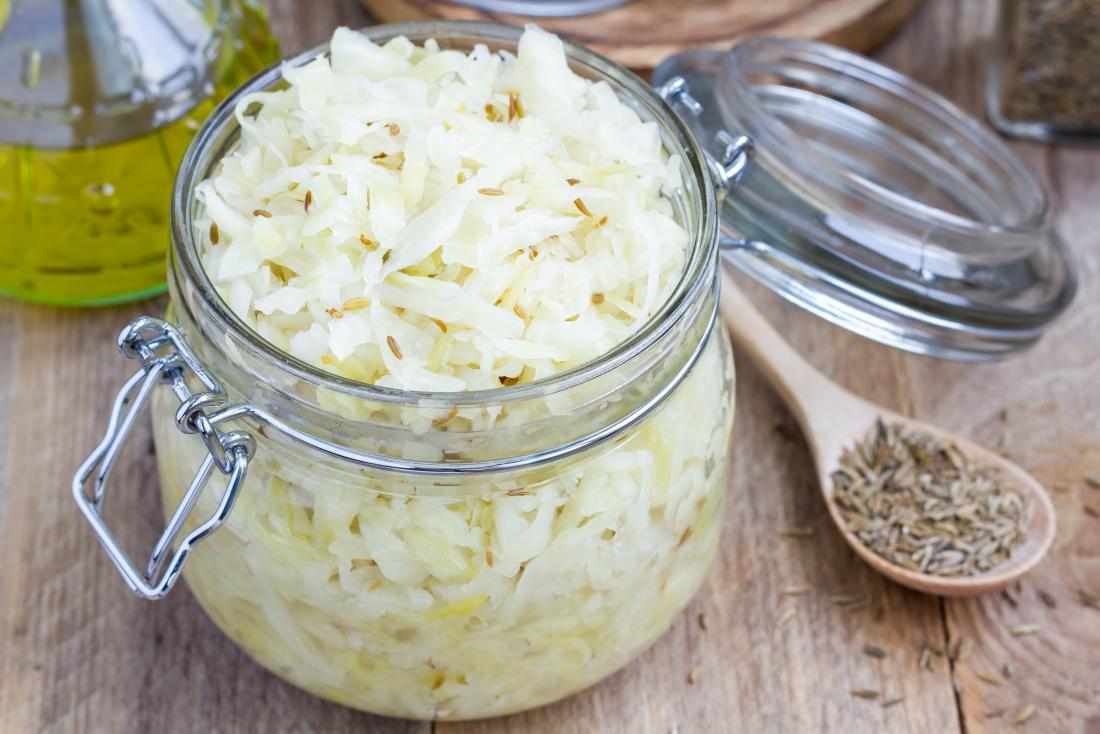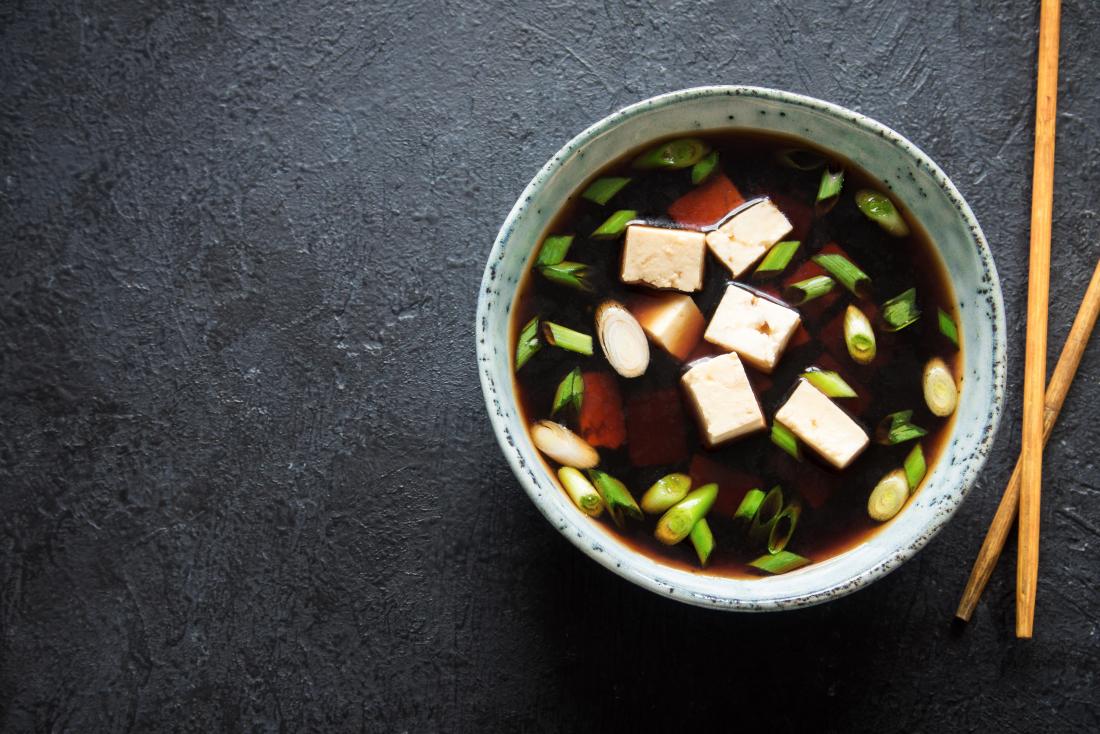While yogurt is one of the most popular dietary sources of probiotics, it is not suitable for vegans. Luckily, there are many other ways for people on a plant-based diet to eat more probiotics.
In this article, we list the best vegan probiotics, as well as their health benefits.
The best vegan probiotics
The best vegan probiotic foods include:
1. Sauerkraut

Sauerkraut is rich in probiotics and vitamins C and K.
Sauerkraut is a fermented cabbage dish that is popular in many Eastern European countries.
It is rich in probiotics, as well as potassium and vitamins C and K. People can make sauerkraut by letting finely cut cabbage ferment in brine, which is a highly concentrated saltwater solution.
The Lactobacillus bacteria on cabbage convert its sugars into lactic acid. The result is a crunchy and sour condiment that works well in sandwiches, salads, or on its own.
Many health-food stores and supermarkets also sell sauerkraut. It is best to choose an unpasteurized product, as pasteurization destroys much of the beneficial bacteria.
Sauerkraut is also available to purchase online.
2. Kimchi
Kimchi is a spicy, fermented cabbage dish that is popular in Korean cuisine. It contains probiotics, vitamins, and antioxidants. The process for making kimchi is similar to that of sauerkraut, but it also includes spices and some other vegetables.
People can make kimchi at home or find it in health-food stores. Vegans who are eating out should check that restaurant kimchi does not contain seafood.
3. Pickled vegetables
Pickling vegetables in brine creates a tasty, probiotic-rich snack or side dish that is suitable for vegans. It is possible to ferment almost any vegetable, but some of the most popular options include:
- cucumbers
- carrots
- radishes
- green beans
- cauliflower
- red bell peppers
For extra flavor, people can add herbs and spices, such as:
- garlic
- bay leaves
- black peppercorns
- coriander seeds
Although fermented vegetables are rich in several nutrients, they also contain a lot of sodium. To avoid the risks of a high-salt diet, such as high blood pressure and water retention, people should enjoy pickled foods in moderation.
4. Kombucha
Kombucha is a fermented tea that has had a revival in recent years. To brew kombucha, people will need a SCOBY starter, which is a symbiotic culture of bacteria and yeast. This gelatinous mass does not look very appetizing, but it is full of beneficial microorganisms.
SCOBY starters are available online or in health-food stores. Alternatively, people can buy ready-brewed kombucha in some coffee shops and supermarkets.
Kombucha contains low levels of alcohol. Some versions contain enough alcohol to classify them as beer, so they may not be suitable for some people, including those who are pregnant or breastfeeding.
5. Water kefir
Water kefir is a probiotic beverage. As with kombucha, it requires a starter culture of bacteria and yeast, which comes in the form of water kefir grains. These are available online, in health-food stores, or from fermented-food enthusiasts.
Water kefir grains help ferment sugar water, juice, or coconut water to form a mild-flavored and healthful drink. With proper care, the grains grow regularly and survive for years.
Vegans should avoid milk kefir and milk kefir grains, as these are dairy-based.
6. Tempeh
Tempeh is a soy-based food that is similar to tofu but involves the fermentation of the soybeans. As a result of this fermentation, tempeh is rich in probiotics and protein. Its firm texture makes it suitable for use in a variety of dishes.
Vegans can use tempeh in salads, stir-fries, burgers, sandwiches, and more. It is also an excellent source of protein.
7. Sourdough bread
Traditional sourdough bread requires a sourdough starter, which is a combination of flour and water that has fermented for several days.
A person must regularly “feed” the starter with flour to allow them to use it again and again to make fresh sourdough bread.
Not all sourdough bread contains probiotics, so it is essential to check the ingredients first. Many stores and companies do not use a fermented starter culture to make their sourdough.
8. Miso

Many recommend miso soup as a probiotic option for vegans.
Rich in antioxidants, B vitamins, and beneficial bacteria, miso soup is a great option for vegans looking for a probiotic fix.
Other uses for miso paste include:
- salad dressings
- stir-fry sauces
- marinades
It is vital to use warm, rather than hot, water when making miso soup, as high temperatures kill probiotic bacteria.
9. Fortified dairy alternatives
Some fermented dairy alternatives, such as soy- and nut-based milk and yogurts, contain live cultures. Manufacturers add these beneficial bacteria to dairy alternatives to boost their health benefits.
A person can check the label for Lactobacillus and other probiotic strains in these products.
10. Supplements
While probiotic-rich foods are a good option for vegans, not everyone has the time to make these foods, and some people may not like how they taste. In these cases, supplements offer an easy alternative.
Not all probiotic supplements are suitable for vegans, however, so always check the label carefully.
The United States Food and Drug Administration (FDA) do not regulate probiotic supplements, so there is no guarantee that these products contain the strains of bacteria that the manufacturers claim they do. People should research products before buying them and ensure that they come from a reputable source.
Probiotic supplements are available in health-food stores, some pharmacies, and online.
Benefits of probiotics
Research into the benefits of probiotics for health is ongoing. Researchers are discovering that different strains of bacteria have a range of effects on the body. It may be best to eat a variety of probiotic-rich foods to ensure that different strains enter the body.
Some of the potential benefits of probiotics include:
- Improved digestion: Probiotics help break down food and speed up digestion. They may also reduce constipation and symptoms of Crohn’s disease and irritable bowel syndrome (IBS).
- Reduced risk of cancer: Studies indicate that disturbances of the gut microbiota may play a role in various diseases, such as inflammatory bowel disease (IBD) and colitis-associated cancer. As a result, researchers suggest that probiotics may help prevent these diseases.
- Vaginal health: The vagina contains an abundance of bacteria. Antibiotics, spermicides, and birth control pills can throw off the delicate balance in the vaginal tract, leading to infection. Probiotics may restore the balance and help prevent these issues.
- Mental health: Experts believe that good gut health may influence mental health. Research suggests that probiotics may reduce feelings of depression and anxiety, although additional studies are necessary to confirm this.
- Fewer antibiotic side effects: Over a third of people who take antibiotics develop antibiotic-associated diarrhea (AAD). Therefore, some doctors recommend that people take probiotics alongside antibiotics to prevent AAD.
- Reduced risk of metabolic diseases: Obesity, type 2 diabetes, and non-alcoholic fatty liver disease are types of metabolic disease. Regularly consuming probiotics may prevent and treat these conditions.
- Diabetes management: Other research reports that probiotics may improve glycemic control and lipid metabolism in people with type 2 diabetes.
Takeaway
Probiotic bacteria offer many health benefits, including a reduced risk of disease and improved vaginal and mental health.
To further support healthy gut flora, a person can also regularly consume foods rich in prebiotics, which are fibers that feed gut bacteria and help them thrive.
Probiotic-rich foods are a delicious way to include more beneficial bacteria in the diet. Even without eating dairy, vegans can enjoy an array of fermented foods and drinks that boost their gut health and overall well-being.
